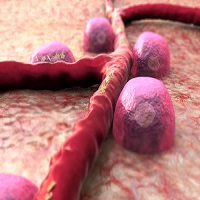Pancreatic progenitor cells
What is
pancreatic stem cell?
Pancreatic
progenitor cells are stem cells originating from the
developing fore gut
endoderm which
have potential of differentiating into lineage specific progenitors, thus liable for the pancreas development. Giving rise to exocrine
as well as endocrine cells. Acinar cells are being established from exocrine cells.
The Beta cell makes insulin, glucagon is secreted form alpha cells, somatostatin
is secreted form delta cell while pancreatic polypeptide is secreted by
PP-cells.
Pancreatic
stem cells have ability of regenerating beta cells
 It has been confirmed
by the researchers that human pancreas contain progenitor cells stimulates by
developing into glucose responsive
beta cells. Thus, researchers are finding way towards rising regenerative cell
therapies for type 1 diabetes patients. This will be a major challenge that stands in the way of inventing
biological treatment for the disease.
It has been confirmed
by the researchers that human pancreas contain progenitor cells stimulates by
developing into glucose responsive
beta cells. Thus, researchers are finding way towards rising regenerative cell
therapies for type 1 diabetes patients. This will be a major challenge that stands in the way of inventing
biological treatment for the disease.
For the decades it has
been postulated that pancreas harbours progenitor cell has ability of
regenerating islets, but not
conclusively demonstrated. Scientists at the Diabetes Research
Institute at the University of Miami Miller School of
Medicine is being pinpointing the precise anatomic location of
stem cells & validate their proliferative ability of turning into glucose-responsive
beta cells.
The capability of
offering regenerative medicine approaches to refurbish production of insulin
within native pancreas would help in replacing the necessity for
transplantation of insulin forming cells. Avoiding
immune destructiveness annulment of autoimmunity in insulin forming cells which
is been form newly could be required by type 1 diabetes. For this purpose, currently,
efforts are congregating on immune tolerance which can induce without the help
of anti-rejection drug for whole life.
Related Scientists
Dr Camillo Ricordi, Dr Juan
Dominguez-Bendala, Dr Ricardo Pastori
for details: https://stemcell-regenerative.conferenceseries.com/


Comments
Post a Comment